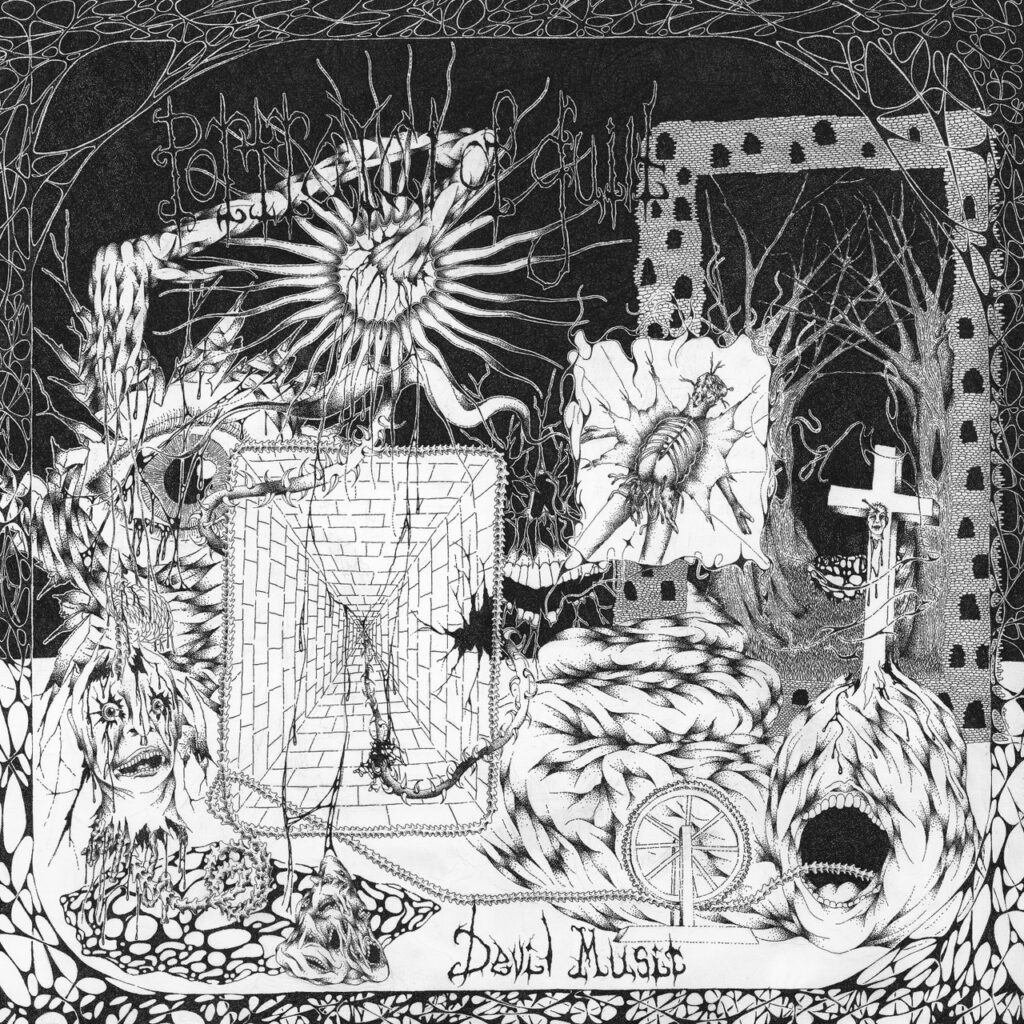There are so many ways music can make people uncomfortable, and Portrayal of Guilt have tried nearly all of them. The Austin trio’s journey from screamo to blackened noise culminated in last year’s Christfucker, where new levels of extremity and ugliness were amplified by the band’s command of dynamics: It could make blank space sound just as terrifying as wall-to-wall static. Devil Music is a more straightforward and refined version of the same idea, an exploration of the greening skeleton beneath Christfucker’s rotting skin.
On Devil Music, whose two halves present the same five songs in radically different arrangements, Portrayal of Guilt bring their energy to bear on composition and form as much as the actual performance. These songs are elaborately plotted, moving efficiently from section to section, though played with a ferocity that makes them feel like they’ve been belched out spontaneously. Their complexity is made plain by the album’s second half, in which the songs from the first are presented as chamber music, re-arranged predominantly for cello, french horn, and tuba. Symphonic metal has existed for nearly as long as metal itself, but these resurrected versions don’t invest the music with a greater drama or make Portrayal of Guilt’s evil feel like anything more cosmic than the product of a few misanthropic dudes.
Portrayal of Guilt sound firmly in control, even when they’re playing warp-speed black metal, and the album’s most moving moments are the result of subtle changes. There is none of the blitzing antsiness of grindcore, none of the torpor of sludge; they’re focused enough to know when these songs feel naturally ready to move on—then they hold onto them for a moment longer. Opener “One Last Taste of Heaven” ramps from strutting nu-metal to anxious blast beats and into a muddy groove in its first 30 seconds, each change articulated by drummer James Beveridge’s shifting of the beat. He’s everywhere on Devil Music, digging deep trenches, foaming up into maximalism, executing wind-sprints; the perpetual ringing of his cymbals surrounds the music like a brassy, acidic container.
Even the more obvious moves feel novel. Singer and guitarist Matt King has spoken frequently about his love of horror movies and his desire to create musical jump-scares. As in film, the quick cut from relative calm to burning chaos can be gimmicky, but when the seething, repetitive industrial grind of “Burning Hand” is snipped by the opening maelstrom of “Where Angels Come to Die”’s black metal, it’s genuinely terrifying, and a reminder that even the most brutal sounds can become a comfort if you sit with them long enough.
King’s vocal roar blots out much of what he has to say as a lyricist, but what comes through seems to have been written from deep within the thickets of anxiety—or while being fucked by satan on a bed of nails. There’s a morbid tenderness to his songwriting, and at times he sounds like Anaïs Nin describing a Cannibal Corpse album cover: “The cold touch grazes my cheek before her fingers enter my mouth,” he sings in the title track, and his coo of “No one will ever hurt me the way you do” over a thick Hum riff in the song’s fadeout is Devil Music’s one purely angelic moment.
By stripping away much of the distortion, the songs’ sense of interdependence becomes more obvious during the second half of the record, giving the album the topography of a symphony with none of the majesty. The chamber versions are smaller and leaner, and the clarity of the sound shows the warts and abrasions in King’s riffing; his melodies bulge and shrink at unexpected moments. Cellist Rachel Gawell mimics most of King’s guitar parts, sawing open “One Last Taste of Heaven” and “Untitled” in a way that reveals the latter’s riff as an echo and elaboration of the former. You can hear elements of Jonny Greenwood’s There Will Be Blood score in how Gawell plays her cello so tightly it sounds like it’s choking, and elsewhere she briefly nods toward Bernard Herrmann’s Psycho score. But she and french horn player Rachel Drehmann and tuba player Joe Exley use the natural midrange and bass registers of their instruments to keep this music close to the earth. Like Lingua Ignota’s Caligula, Devil Music recognizes that there’s just as much horror and pain to be found in the light of day as there is in the darkest crevices. It’s dirty, smudged music, bitter with the terroir of suffering.
All products featured on Pitchfork are independently selected by our editors. However, when you buy something through our retail links, we may earn an affiliate commission.

